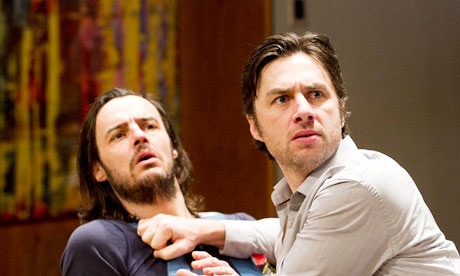
Thanks to the TV series Scrubs and the film Garden State, Zach Braff clearly enjoys cult status in Britain. His first appearance in his own play, All New People, is greeted by his young fans with a whoosh of delight, abruptly terminated by the fact that he is perched on a chair trying to hang himself. But what promises to be a savagely black comedy turns into a muddled, meandering affair that reeks of self-gratification.
Braff's character, Charlie, is a suicidal thirtysomething intent on ending his life in a friend's deserted beach house in midwinter. But his plans are thwarted by a succession of visitors. First comes Emma, a gabby British estate agent hoping to rent the property. Confronted by a potential suicide, Emma sends for her mate Myron, who is the drug-dispensing local fire chief. The final arrival is Kim, a glamorous $15,000-a-night prostitute despatched by the property owner to cheer up the depressed Charlie.
Attempted self-slaughter can, somewhat surprisingly, be a rich subject for comedy: one has only to think of Ayckbourn's Absurd Person Singular or Nikolai Erdman's great Russian satire The Suicide, in which everyone seeks to exploit the death-prone hero. But, after a lively beginning, all Mr Braff has to offer is a series of bromides which proclaim "we all have pain, Charlie" or which hymn "the gift of knowing you're not alone". To reinforce the point that all the characters share Charlie's plight, Braff punctuates the action with a series of film clips revealing everyone's back-story. Whatever happened, I wondered, to the art of exposition?
One or two lines hint at Braff's comic talents: love is described as "like trying to build a house of cards on the back of a squirrel". But what finally undoes the play is its mixture of sentimentality and sexism. I could hardly believe my eyes when the promiscuous fireman, as a reward for reciting Shylock's "Hath not a Jew eyes?" speech, is allowed to fondle the highly paid escort's breasts. The moment is somehow made even more excruciating by the fact that Susannah Fielding, who plays Kim, was last seen as a brilliant Portia in The Merchant of Venice.
Peter DuBois, who directed the far superior Becky Shaw at London's Almeida, handles the action capably and the actors do all that is required of them. The talented Fielding seems content to play a male fantasy. Paul Hilton is suitably strange as the druggy firefighter and Eve Myles as Emma gives off the appropriate air of panic. As for Braff, you could say that he generously allows the other actors to motor the action. But I notice that he also occupies a key upstage position for much of the evening. And when Emma finally says: "You know you really are cute, Charlie," I began to see the play for what it is: not merely a soggy reminder that we are all entitled to be unhappy but also an act of profound self-veneration.

